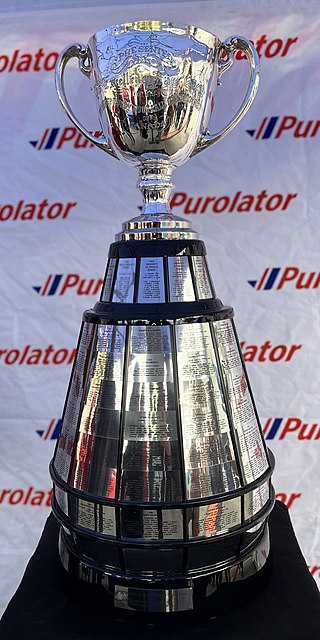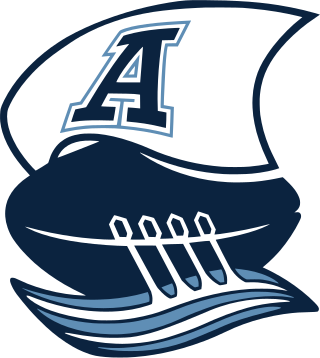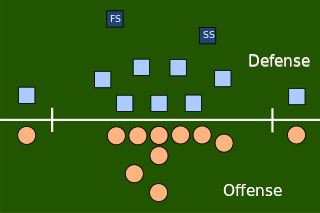
Canadian football, or simply football, is a sport in Canada in which two teams of 12 players each compete on a field 110 yards (101 m) long and 65 yards (59 m) wide, attempting to advance a pointed oval-shaped ball into the opposing team's end zone.
July 20 is the 201st day of the year in the Gregorian calendar; 164 days remain until the end of the year.
July 17 is the 198th day of the year in the Gregorian calendar; 167 days remain until the end of the year.
July 19 is the 200th day of the year in the Gregorian calendar; 165 days remain until the end of the year.

The Canadian Football League is a professional sports league in Canada. The CFL is the highest level of competition in Canadian football. The league consists of nine teams, each located in a city in Canada. They are divided into two divisions: four teams in the East Division and five teams in the West Division. As of 2024, it features a 21-week regular season in which each team plays 18 games with three bye weeks. This season traditionally runs from mid-June to early November. Following the regular season, six teams compete in the league's three-week playoffs, which culminate in the Grey Cup championship game in late November. The Grey Cup is one of Canada's largest annual sports and television events. The CFL was officially named on January 19, 1958, upon the merger between the Interprovincial Rugby Football Union or "Big Four" and the Western Interprovincial Football Union.

The Grey Cup is both the championship game of the Canadian Football League (CFL) and the trophy awarded to the victorious team playing in the namesake championship of professional Canadian football. The game is contested between the winners of the CFL's East and West Divisional playoffs and is one of Canadian television's largest annual sporting events. The Toronto Argonauts have the most Grey Cup wins (18) since its introduction in 1909, while the Edmonton Elks have the most Grey Cup wins (11) since the merger in 1958. The latest, the 110th Grey Cup, took place in Hamilton, Ontario, on November 19, 2023, when the Montreal Alouettes defeated the Winnipeg Blue Bombers 28–24.

The Edmonton Elks are a professional Canadian football team based in Edmonton, Alberta. The club competes in the Canadian Football League (CFL) as a member of the league's West Division and plays their home games at Commonwealth Stadium. The Elks were founded in 1949 as the Edmonton Eskimos and have won the Grey Cup championship fourteen times, most recently in 2015 and the most of any CFL club based in Western Canada. The team has a rivalry with the Calgary Stampeders and is one of the three community-owned teams in the CFL. The team discontinued using the Eskimos name in 2020, with the new name Elks formally announced on June 1, 2021.

The CONCACAF Gold Cup is the main association football competition of the men's national football teams governed by CONCACAF, determining the continental champions of North America. The Gold Cup is held every two years. The tournament succeeded the CONCACAF Championship (1963–1989), with its inaugural edition being held in 1991.

The Toronto Argonauts are a professional Canadian football team competing in the East Division of the Canadian Football League (CFL), based in Toronto, Ontario. Founded in 1873, the team is the oldest existing professional sports team in North America still using its original name, as well as the oldest-surviving team in both the modern-day CFL and East Division. The team's origins date back to a modified version of rugby football that emerged in North America in the latter half of the 19th century. The Argonauts played their home games at Rogers Centre from 1989 until 2016, when the team moved to BMO Field, the fifth stadium site to host the team.

The Confederation of North, Central America and Caribbean Association Football, abbreviated as CONCACAF, is one of FIFA's six continental governing bodies for association football. Its 41 member associations represent countries and territories mainly in North America, including the Caribbean and Central America, and, for geopolitical reasons, three nations from the Guianas subregion of South America—Guyana, Suriname, and French Guiana. The CONCACAF's primary functions are to organize competitions for national teams and clubs, and to conduct the World Cup and Women's World Cup qualifying tournaments.

In gridiron football, defensive backs (DBs), also called the secondary, are the players on the defensive side of the ball who play farthest back from the line of scrimmage. They are distinguished from the other two sets of defensive players, the defensive linemen who play directly on the line of scrimmage, and the linebackers, who play in the middle of the defense, and between the defensive line and the defensive backs.

Gridiron football, also known as North American football, or in North America as simply football, is a family of football team sports primarily played in the United States and Canada. American football, which uses 11 players, is the form played in the United States and the best known form of gridiron football worldwide, while Canadian football, which uses 12 players, predominates in Canada. Other derivative varieties include arena football, flag football and amateur games such as touch and street football. Football is played at professional, collegiate, high school, semi-professional, and amateur levels.
The Canada men's national soccer team represents Canada in international soccer competitions since 1924. They are overseen by the Canadian Soccer Association, the governing body for soccer in Canada. They have been a member of FIFA since 1948 and of CONCACAF since 1961.

The Canadian Soccer Association is the governing body for soccer in Canada. Headquartered in Ottawa, Ontario, the federation is a full member of FIFA and governs Canadian soccer at the international, professional, and amateur levels, including: the men's and women's national teams, Canadian Premier League, youth organizations, beach soccer, futsal, Paralympic and deaf national teams. The Canadian Soccer Association also administers and operates the Canadian Championship.

Rugby Canada is the national governing body for the sport of rugby union in Canada. Rugby Canada was incorporated in 1974, and stems from the Canadian Rugby Football Union, a body established in 1884 that now governs amateur Canadian football as Football Canada; and the now-defunct Rugby Union of Canada, established in 1929. Rugby Canada administers the Canada national rugby union team and sanctions the Rugby Canada National Junior Championship, a national competition for under-20 men's teams. It previously sanctioned the Super League as the premier level of men's competition in the country, but scrapped that league after the Americas Rugby Championship was created in 2009 as a two-stage competition in which the first involved only Canadian teams.

Safety (S), historically known as a safetyman, is a position in gridiron football on the defense. The safeties are defensive backs who line up ten to fifteen yards from the line of scrimmage. There are two variations of the position: the free safety (FS) and the strong safety (SS). Their duties depend on the defensive scheme. The defensive responsibilities of the safety and cornerback usually involve pass coverage towards the middle and sidelines of the field. While American (11-player) formations generally use two safeties, Canadian (12-player) formations generally have one safety and two defensive halfbacks, a position not used in the American game.

U Sports football is the highest level of amateur play of Canadian football and operates under the auspices of U Sports, Canada's governing body for university sports. Twenty-seven teams from Canadian universities are divided into four athletic conferences, drawing from the four regional associations of U Sports: Canada West Universities Athletic Association, Ontario University Athletics, Réseau du sport étudiant du Québec, and Atlantic University Sport. At the end of every season, the champions of each conference advance to semifinal bowl games; the winners of these meet in the Vanier Cup national championship.

American football, referred to simply as football in the United States and Canada and also known as gridiron football, is a team sport played by two teams of eleven players on a rectangular field with goalposts at each end. The offense, the team with possession of the oval-shaped football, attempts to advance down the field by running with the ball or throwing it, while the defense, the team without possession of the ball, aims to stop the offense's advance and to take control of the ball for themselves. The offense must advance at least ten yards in four downs or plays; if they fail, they turn over the football to the defense, but if they succeed, they are given a new set of four downs to continue the drive. Points are scored primarily by advancing the ball into the opposing team's end zone for a touchdown or kicking the ball through the opponent's goalposts for a field goal. The team with the most points at the end of the game wins.

Football is a family of team sports that involve, to varying degrees, kicking a ball to score a goal. Unqualified, the word football generally means the form of football that is the most popular where the word is used. Sports commonly called football include association football ; Australian rules football; Gaelic football; gridiron football ; International rules football; rugby league football; and rugby union football. These various forms of football share, to varying degrees, common origins and are known as "football codes".

The 2015 FIFA Women's World Cup was the seventh FIFA Women's World Cup, the quadrennial international soccer championship contested by the women's national teams of the member associations of FIFA. The tournament was hosted by Canada for the first time and by a North American country for the third time. Matches were played in six cities across Canada in five time zones. The tournament began on 6 June 2015, and finished with the final on 5 July 2015 with a United States victory over Japan.















